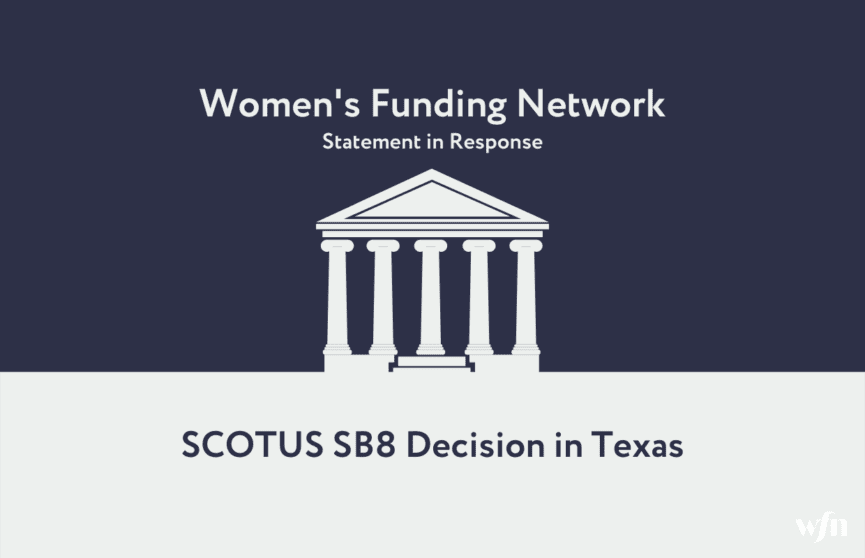As an organization dedicated to advancing the liberation, financial and otherwise, of all genders, the Women’s Funding Network unequivocally asserts that reproductive rights are human rights. Abortion is healthcare. It is a moral imperative that anyone with the ability to become pregnant have access to safe and legal care that respects their dignity, privacy, and personal freedom.
With the Court allowing the lawsuit against the Texas S.B. 8 to proceed in lower courts, while throwing out the Department of Justice case, it’s unclear what will happen—the lower court judge who blocked the law before will likely do it again, but then his decision would then be reviewed by an appeals court, which has allowed the abortion ban.
We are shocked, angry, and disappointed that the Supreme Court is allowing the ban to stand while its fate is decided in court—it’s already been three months of an almost complete restriction on abortion care in Texas, which harms women and deprives us of the rights to our own bodies every single day.
While abortion rates have dropped in Texas, they have soared tremendously in neighboring states like Oklahoma, New Mexico, Louisiana, and Kansas. It reaffirms what we already know: that women in the U.S. with financial means—usually white women—have always been able to access safe abortions, regardless of the law. Roe v. Wade, the landmark ruling from 1973 that leveled the field so that women of color and lower-income women could have safe abortions too. Our country’s laws should strive to serve our community with fair systems that apply equally for all of us, not just for some of us. It’s alarming that the Court’s majority opinion never mentions Roe.
Data shows that abortion bans further hurt those who are already hurting financially: survivors of rape, those struggling to make ends meet, women and girls of color, young people, immigrants and refugees. Studies show that the most common reason women give for choosing an abortion was not being able to afford having a child. Research shows that a woman who wants to end a pregnancy but is denied is more likely to live in poverty and have a hard time affording groceries and rent than one who was able to get an abortion. This “turnaway effect” persists for years, and is a major driver in trapping marginalized women in poverty for generations.
As feminist funders, we understand that the relationship between abortion bans and poverty has never been more clear: Our Women’s Economic Mobility Hubs found that key barriers to economic mobility for women include biases in hiring, wage gaps, lack of affordable childcare, and lack of health care and paid leave. All of which worsen a woman’s financial situation if she is denied the ability to determine if and when to have a child.
If you have been fighting for women’s rights, keep fighting. If you haven’t been active in the fight, now’s your chance—we need each other more than ever before. Now is the time to show up for people of all genders whose reproductive rights are continuously and systematically under attack.
We ask you to:
- Contact your Senators and demand they pass the Women’s Health Protection Act, federal legislation to protect the right to access abortion care
- Educate yourself and others about safe, self-managed abortion
- Donate to the organizations doing vital work on the ground to support women in accessing abortion care.
We stand with other gender justice funders and organizations as we continue our fight for the rights, liberation, and justice for all.
In solidarity, signed:

Elizabeth Barajas-Román
Women’s Funding Network
President & CEO
